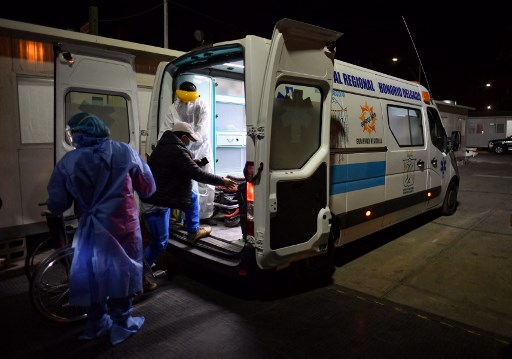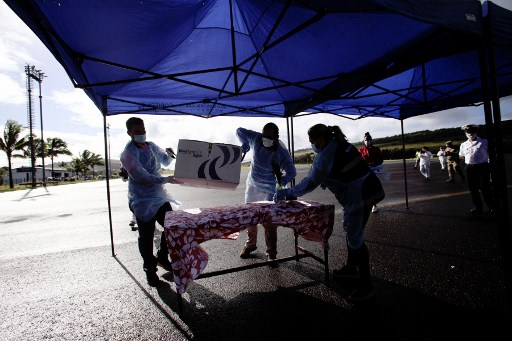Lambda variant has now been detected in at least 29 countries including South America, US, Australia, Israel and parts of Europe

(Eagle News) – A new variant of interest of the COVID-19 virus is yet again causing concern since it was first detected in Peru late last year, amid recent research that indicated it may be more infectious than other variants and could have higher immune escape mechanisms.
The Lambda variant, or C.37, has reportedly infected thousands in South America. It has been detected in 29 countries, eight in Latin America. Recently it has also been discovered in the UK, US, Germany, Australia and in other countries in Europe as well.
The World Health Organization (WHO) classified Lambda as a “variant of interest” and not yet a variant of concern.
On June 23, the UK’s Public Health England (PHE) classified Lambda as a “variant under investigation” due to “international expansion and several notable mutations including L452Q and F490S.”
It has identified six cases of the Lambda variant across the UK as of June 25.
“There is currently no evidence that this variant causes more severe disease or renders the vaccines currently deployed any less effective. PHE is carrying out laboratory testing to better understand the impact of mutations on the behaviour of the virus,” PHE said in a statement.
WHO virologist Jairo Mendez-Rico told DW News earlier that they are still closely studying this Lambda variant and so far they “have seen no indication” that it is more aggressive.
“It is possible that it may exhibit higher infection rates, but we don’t yet have enough reliable data to compare it to gamma or delta,” he said.
“So far we have seen no indication that the Lambda variant is more aggressive,” the WHO virologist Jairo Mendez-Rico said. “It is possible that it may exhibit higher infection rates, but we don’t yet have enough reliable data to compare it to gamma or delta.”
-Chile research on Lambda variant’s “infectivity and immune escape”-
Chilean researchers, however, who studied the Lambda variant noted “the presence of critical mutations in the spike protein.”
Concerned about the “impact of such mutations in infectivity and immune escape from neutralizing antibodies,” Chilean scientists and researchers Mónica L. Acevedo, Luis Alonso-Palomares, Andrés Bustamante, Aldo Gaggero, Fabio Paredes, Claudia P. Cortés, Fernando Valiente-Echeverría, and Ricardo Soto-Rifo conducted their study on Santiago City health workers. The results of their study which had not yet been peer reviewed was published on July 1 in the medRxiv preprint server for health sciences.
The health workers who were the subject of their study received two doses of CoronaVac vaccine of Sinovac.
-More infectious than Alpha and Gamma variants-
“We observed an increased infectivity mediated by the Lambda spike protein that was even higher than that of the D614G (lineage B) or the Alpha and Gamma variants. Compared to the Wild type (lineage A), neutralization was decreased by 3.05-fold for the Lambda variant while it was 2.33-fold for the Gamma variant and 2.03-fold for the Alpha variant,” the researchers explained in their study results.
“Our results indicate that mutations present in the spike protein of the Lambda variant of interest confer increased infectivity and immune escape from neutralizing antibodies elicited by CoronaVac,” they said in the published preprint of their research.
They noted the importance of continuing genomic surveillance of COVID-19 cases even in countries with massive vaccination campaigns. This is to further determine the impact of the mutations in escaping immunity.
“These data reinforce the idea that massive vaccination campaigns in countries with high SARS-CoV-2 circulation must be accompanied by strict genomic surveillance allowing the identification of new isolates carrying spike mutations and immunology studies aimed to determine the impact of these mutations in immune escape and vaccines breakthrough,” they said.

In Chile, there is an “intentive vaccination campaign which mostly relies in the inactivated virus vaccine from Sinovac Biotech and to a lesser extent in the mRNA vaccine from Pfizer/BioNTech and the non-replicative viral vector vaccines from Oxford/AstraZeneca and Cansino Biologicals.”
Still, the scientists noted that the last surge reported there “has been dominated by the SARS-CoV-2 variants Gamma and Lambda, the former classified as a variant of concern several months ago and the latter being recently recognized as a variant of interest by the WHO.”

According to another research pre-print published in medRxiv, the Lambda variant “now accounts for 97% of Peruvian public genomes in April 2021.”
“It is expanding in Chile and Argentina, and there is evidence of onward transmission in Colombia, Ecuador, Mexico, the USA, Germany, and Israel,” said a study entitled “The Emergence of SARS-CoV-2 Variant Lambda (C.37) in South America” posted by researchers and scientists mostly from Peru in the medRxiv preprint posted on July 3.
The new variant has emerged even in countries with high vaccination rates.
The results of the research published in the medRxiv preprint has not yet been peer-reviewed. The researchers who conducted this study were Pedro E. Romero, Alejandra Dávila-Barclay, Guillermo Salvatierra, Luis González, Diego Cuicapuz, Luis Solis, Pool Marcos-Carbajal, Janet Huancachoque, Lenin Maturrano, and Pablo Tsukayama.
(Eagle News Service)







